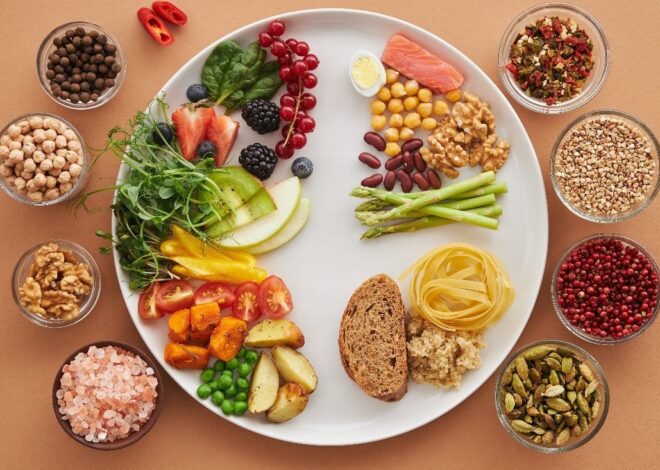
How to Improve Gut Health: Foods and Habits to Consider
Good gut health is essential for overall well-being, impacting digestion, immunity, mental health, and even skin. While the balance of “good” and “bad” bacteria in the gut microbiome plays a crucial role, diet and lifestyle choices significantly influence this balance. Here’s a guide on how to improve gut health with foods and habits to incorporate into your daily routine.
1. Eat More Fiber-Rich Foods
Dietary fiber is one of the best ways to keep your gut in good health, as it feeds beneficial bacteria and promotes regular bowel movements.
- Foods to Include: Fruits (such as apples, bananas, and berries), vegetables (especially leafy greens), whole grains (oats, brown rice, quinoa), and legumes (beans, lentils).
- Prebiotic Fiber: Foods like garlic, onions, leeks, asparagus, and bananas contain prebiotics, a type of fiber that feeds good bacteria, helping them flourish in the gut.
2. Incorporate Probiotics into Your Diet
Probiotics are live bacteria and yeasts that help maintain a healthy balance in the gut microbiome.
- Sources of Probiotics: Yogurt with live cultures, kefir, sauerkraut, kimchi, miso, kombucha, and fermented pickles are rich in probiotics.
- Benefits: Probiotics can help with digestion, reduce symptoms of irritable bowel syndrome (IBS), and enhance immunity by supporting gut health.
3. Stay Hydrated
Water plays an essential role in digestion, nutrient absorption, and waste elimination, all of which contribute to a healthy gut.
- Aim for Adequate Water Intake: Adults should aim for about 8 glasses (2 liters) of water per day, but this can vary depending on activity level and climate.
- Hydration Helps with Fiber: If you’re consuming more fiber, drinking enough water is essential, as fiber absorbs water and helps move waste through the intestines.
4. Limit Processed and Sugary Foods
Processed foods and excess sugar can lead to inflammation in the gut and promote the growth of harmful bacteria, disrupting the gut’s balance.
- High-Sugar Foods: Sweets, sugary drinks, and processed snacks often lead to a spike in sugar levels that can cause digestive problems and disrupt the gut microbiome.
- Artificial Sweeteners: Studies show that artificial sweeteners, such as aspartame and sucralose, may negatively impact gut health by reducing beneficial bacteria and potentially causing bloating and gas.
5. Eat a Diverse Range of Foods
Diversity in diet contributes to a diverse microbiome, which is beneficial for overall health.
- Experiment with Different Fruits and Vegetables: A variety of plant foods can provide different types of fiber and nutrients that support various bacteria.
- Seasonal Eating: Try incorporating seasonal fruits and vegetables into your diet for variety and added nutrition.
6. Manage Stress Levels
Stress can directly affect your gut health by altering the gut’s environment and impacting digestion.
- Mindful Practices: Meditation, deep breathing exercises, and yoga can reduce stress and support gut health.
- Regular Physical Activity: Exercise has been shown to encourage the growth of beneficial gut bacteria, so try to incorporate regular physical activity into your lifestyle.
7. Get Enough Sleep
Quality sleep helps the body recover and supports overall gut health by maintaining a stable environment for beneficial bacteria.
- Aim for 7-9 Hours of Sleep: Consistent, quality sleep helps regulate the body’s systems, including digestion.
- Avoid Late-Night Meals: Eating right before bed can disrupt digestion and may interfere with sleep, affecting both sleep quality and gut health.
8. Add Healthy Fats to Your Diet
Healthy fats help reduce inflammation in the gut and support digestion by aiding the absorption of nutrients.
- Omega-3 Fatty Acids: Found in fatty fish (salmon, mackerel), chia seeds, and flaxseeds, omega-3s have anti-inflammatory properties that benefit the gut.
- Extra Virgin Olive Oil: This healthy fat contains polyphenols that act as antioxidants, supporting the health of beneficial gut bacteria.
9. Avoid Overusing Antibiotics
While antibiotics are necessary for treating bacterial infections, overusing them can wipe out beneficial bacteria and disrupt the gut microbiome.
- Only Take Antibiotics When Necessary: If prescribed, discuss alternative treatments with your doctor if possible.
- Rebuild Gut Health After Antibiotics: If antibiotics are unavoidable, consider eating probiotic-rich foods to help restore the balance of bacteria in your gut.
10. Consider Taking Supplements
Certain supplements can support gut health by providing nutrients and beneficial bacteria.
- Probiotic Supplements: These can help increase the levels of good bacteria in the gut, especially if you’re unable to get probiotics from food.
- Digestive Enzymes: These can support digestion, especially if you have issues digesting certain foods.
- Vitamin D: Adequate vitamin D levels are essential for immune health and can positively impact the gut microbiome.
Final Thoughts
Improving gut health is not about making a single change but rather adopting a holistic lifestyle approach. Eating a diet rich in fiber, prebiotics, probiotics, and a diverse array of whole foods, while also managing stress, staying hydrated, and getting quality sleep, will all support a healthy gut microbiome. By prioritizing these habits, you can help create a balanced gut environment that will benefit your entire body.



